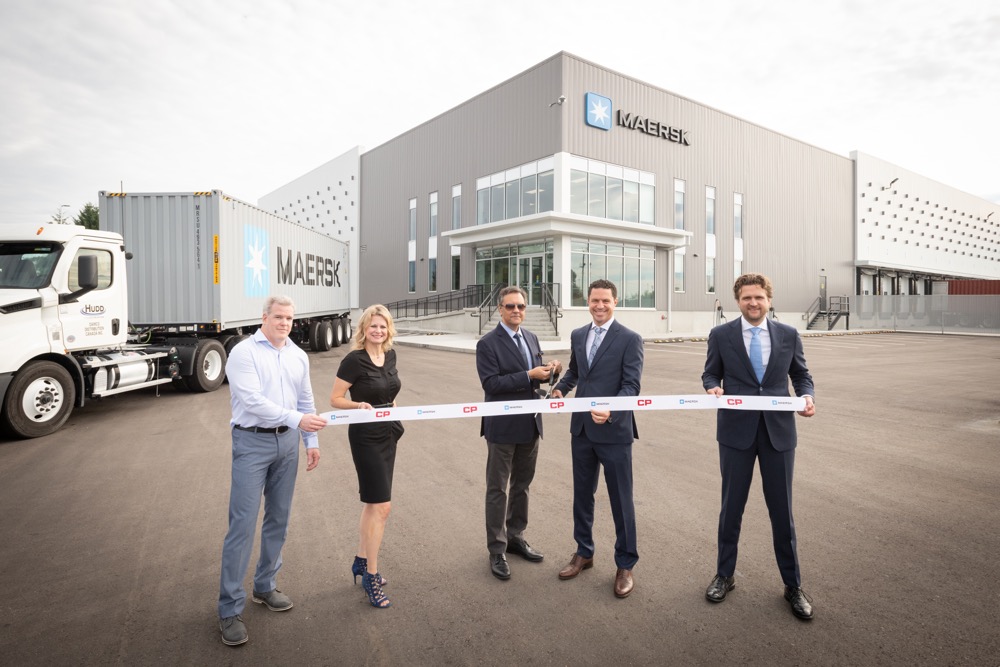Vancouver – Maersk and Canadian Pacific (CP) opened on September 9 the new 117,000 square foot, 103 door Pacific Transload Express facility designed to make Asia/Pacific Northwest (PNW) supply chains more resilient, flexible and cost-effective. The ability to transload international containers into domestic 53-foot trailers enables customers to achieve overall cost savings (per cubic metre) for domestic distribution, while reducing storage costs related to port demurrage and inland detention.
Supply chains flowing through the facility will be fast-moving consumer goods (FMCG) in the retail and lifestyle segment that need agile response capabilities to consumer demand fluctuations. FMCG will comprise 80-90% of the volumes and auto parts 10-20%.
“Bringing this new supply chain asset into play today marks an important new Asia/PNW gateway chapter for customers looking for faster order fulfillment achieved through integrated logistics. We’re looking forward to working with CP to make this a vital pivot point for supply chain planners to help them achieve their business goals,” said Omar Shamsie, President of Maersk Canada.
Construction of the facility and rail infrastructure was completed last month with Maersk commencing the transloading operation of the facility on Sept. 1. The first containers arrived at the facility earlier this week.
“We are very proud to open this first-of-its-kind transload facility that creates tremendous opportunity for sustainable growth,” said CP President and CEO Keith Creel. “We are transforming inbound logistics in North America by reducing transit time variability thanks to CP’s premium service and at the same time having a smaller environmental impact and carbon footprint by taking thousands of trucks off the road while leveraging the inherent benefits of moving goods by rail.”
CP will shuttle containers by rail from the three major Vancouver container terminals to the Pacific Transload Express facility. CP built the facility on CP land at Pitt Meadows adjacent to its Vancouver Intermodal Facility to offer optimal transload services with fewer handoffs and better accountability of service.
“This was an attractive feature to our customers intent on integrating their supply chains for higher performance,” added Mr. Shamsie.
Currently, transit times range from 35 to 75 days from Asia to North America from factory at origin to a distribution centre at destination. With such a big variation, it is difficult for companies to plan supply chain management well while meeting the heightened expectation of cargo delivery to the end consumers. As a result, most companies buy products in advance and build higher safety stock to mitigate the transit time fluctuation, positioning storage solutions closer to their customers.
Erez Agmoni, Head of Maersk North America’s Warehousing & Distribution Product Development, said, “We can help our customers reduce the transit time variation from 35 to 75 days door-to-door to having the cargo consistently at 35-40 days. This helps customers create a more precise and predictable supply chain that helps them reduce safety stock, saving money on inventory storage costs with this transload solution. We are the first and only company providing this solution in the market.” To improve operational execution, there are plans to add a sortation system to support operations.
To support customer environmental social governance (ESG) goals, the Pacific Transload Express facility specifically integrates and extends the use of CP rail service direct from the port of Vancouver as a lower carbon emission choice than multiple trucks in the port complex and on local roads. The new facility will eliminate over 100,000 truck trips per year in the Vancouver area (almost 60,000 round trips per year), and save over 4,000 tons of carbon dioxide (greenhouse gas) emissions /year which is equivalent to the CO2 emissions of 9,261 barrels of oil consumed.
The reductions have two sources: First the shorter direct rail connection between Centerm, Vanterm and Deltaport and the transload facility vs. a triangle route by truck, reducing miles the cargo is moved, and second, the energy efficiency of rail, which is 3-4 times more energy efficient than trucking. (Maersk photo)





